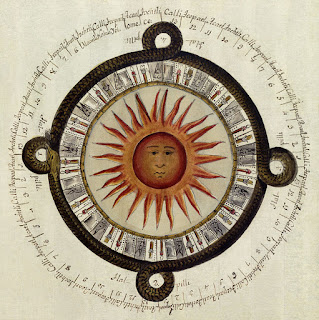I know the other gods
in a more or less perfunctory manner.
The sea-god, whose long and broad wall
looks covered with velvet moss
and, therefore, raises little curiosity.
Agni, whom I remember with some conceit,
as I know parts of his saga,
which is not completely respectable,
so to speak.
It seems to be a matter of universal faith
that he used to be in charge
of Ravana’s kitchen.
I find it difficult though
to understand the reason
for this maliciousness,
when it was no small responsibility.
The god of the wind,
who sneaks in and out
to whisper the status of the seasons,
and last but not the least, death:
who comes like a beggar at the backdoor;
vainly apologetic about his unwanted appearance.
Poor fellow!
As if he could have done anything else!
But I perhaps don’t know anything
about Surjya who gets up before me.
Although people do say
that sunsets are something wonderful,
memorable, in fact.
One does not need to try
to be born and to die.
It is almost involuntary,
like the wagging of the tail of a dog
or the blinking of the eyes.
Therefore,
I have never felt the need
to praise either sunsets or sunrises.
And as we all know,
the sun looks a bit harsh
and tired during the noon.
And I end up doing other things.
During the noon, that is.
But I know the sun in darkness, almost
like a part of my body.
I have always felt
that darkness is like magic.
Darkness that reminds one of the other,
and forbids the similarity of visions.
You are tied to the wheel of your mind.
Roll, but please don’t see the wheel.
Therefore, all memories are like wheels:
they make you rise and fall.
It might be the embrace of a lover
or the desire for warmth
(the source of which might be cold as ice).
But you feel a little pain
in your ribs at first,
unclear like a light breeze
among newborn leaves;
increasing slowly,
till it becomes larger than itself.
You could have broken down like a
piece of thin china
flung down from a table.
Before that though,
one remembers funny inspirations.
But such imaginaries are laughable.
In darkness, that is.
Because it reminds one
of binary opposites.
Because if you try too hard
for too long,
then you can conceivably watch
the fluttering wind threading through the leaves.
And you come to know something;
that Ravana had seen,
but was unable to understand.
That death comes when you see contraries:
when mice hunt mighty snakes;
when cats feed on dog meat;
when tigers sneak away from deer;
and, when sows give birth
to foals occasionally.
The point while concluding
is very precise indeed:
if the horizons are clouded over with sand;
If tears stream down
the eyes of horses and elephants;
then, death is certain.
Everything else
is about being a Fabian.
I, therefore,
know the Lord Surjya,
even though,
I have seen very little of him.
It’s of course a folk belief,
that one is cured
of the most stubborn of diseases,
if Surjya so blesses.
I believe that.
Leaves fall from trees;
first slowly indeed
and then massively, all of a sudden.
The tree is then finally free
of its disease of leaves.
The flowers wither slowly,
but surely.
First one notices
a tiny, withering black spot.
And, then the stamens dry up.
An inexperienced fool might think
that this disease is temporary;
even if serious, then eccentric,
and, therefore, of no consequence.
But then he’ll notice someday
when the sun rises,
that the flower has fallen off,
and that the tree has also turned dark.
I insist again,
that I have an unshakable faith,
in the power of Surjya.
Perhaps Surjya is the only god,
who at least makes things a little clearer.
Both during the day
and during the night,
when you might get a cure.
 |
| Photo Credit – Wikimedia Commons |
Translator’s Note: I have two editions of Ramakanta Rath’s volume of poems ‘SRIRADHA’ (that’s how it’s spelt in its copyright page); the latest one is the book’s eighth incarnation, published in 2013. This is a remarkable fact for a volume of poems in Odia. ‘Sri Radha’ has stayed in print for the last 35 years, ever since it was first published in 1985. It is perhaps one of the most popular books of the last four decades in the language.
What makes it even more bizarre is that in the 1950s Ramakanta Rath (1934-present) started his career as a poet, as an avant-garde writer of high modernist verse, with his ‘Kete Dinara’ – ‘Of How Many Days’ – (1962) and ‘Aneka Kothari’ – ‘Many Rooms’ – (1967) contributing substantively towards creating a tradition of highly allusive, dense poetic language in Odia.
‘Sri Radha’ with its clear poetic diction, mythological overtones, and resonance with an older tradition of Vaishnavite poetry in the language marked a break with his prior work. Much felicitated and honoured, Rath has won the ‘Saraswati Samman’ for ‘Sri Radha’.
(Translated from the Odia original by Sailen Routray)



